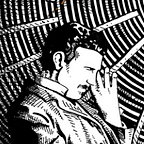Justin Lawrence Daugherty discusses the American western, mythology, and bending genres in Winnette’s novel.
Colin Winnette
Fiction | Novel | 222 pages | 5.1” x 7.8” | Reviewed: Paperback
978–1–9375123–2–3 | First Edition | $16.00
Two Dollar Radio | Columbus, Ohio | BUY HERE
The American Western is mythology. It is a representation. It’s hard to say what is or is not a Western. After performing in Italy, Buffalo Bill Cody’s stories were translated into Italian and, even later, his exploits were used in service of Italian fascism and nationalism, a tool to promote imperialism. Whatever the West was, the fetishizing of the West has produced any number of approximations that are most likely apocryphal.
The western — as in, the genre of the western — is largely a myth of its own. Long gone are the days of Bonanza and John Wayne. The western, as it exists now, seems often to attempt transformation of the genre, to move it away from its romanticized roots. Think of the Iranian vampire western film A Girl Walks Home Alone at Night. Think of Blood Meridian. And, now, add Colin Winnette’s Haints Stay to this new tradition.
Colin Winnette has crafted what some have termed an acid western, others simply a western. Such a term is wrought with some sort of significance, but I feel uneasy terming this book as such. Right away, Sugar — one of the novel’s protagonists, along with brother, Brooke — seems to call attention to the mirage of history and, hence, the western itself:
“Do you read history?” said Sugar.
“Yes and no,” said the tiny man, a smile creeping back into his lips. “I don’t read much, but I know a few things. History, as you put it, it’s slippery.”
If anything, violence is the essential fabric of the western. And Winnette does not shy away from that violence. Instead, he embraces it in often cartoonish ways. Soon after Brooke and Sugar find and take in a young, history-less boy they name Bird, they find men who burned their belongings. They ambush these men and before Brooke and Sugar kill them, Brooke asks one of the men if he’d like to get a hit in before being killed. Sugar tells his brother, “Don’t be grotesque,” before the deed is done. The brothers recognize the fault in this violence even as they perform it.
The novel takes its tropes and recognizes and embraces them. The plot finds the killers-for-hire, between jobs, set upon to answer for their crimes. But Winnette disrupts what we think we know about the western with hints of the fabulist and moments that unsettle the reader from what we expect of the western. Bird, as mentioned before, comes upon the duo without a history, or at least without one he has knowledge of. Sugar takes him to see a nameless man in an unnamed wilderness, a man who seems to know things he cannot and who tells Sugar the boy is theirs to deal with.
The novel answers the question of the western by disrupting it and dismantling expectations. Winnette holds his characters accountable. They are at the mercy of the world, rather than the romanticized controllers of it. Even killers with superhuman abilities to withstand great amounts of violence and injury are, essentially, just meat and blood and bone.
Bird becomes separated early from the brothers and comes to live with a family, while coming to believe these brothers as the causes of his problems. He is imbued with anger and a sense for revenge, but Winnette keeps Bird from the edge. He sees the cyclical nature of this sort of masculinity. Brooke wanders at one point, recalling memories of the men Sugar and he have killed. These memories pile on and give the picture of the western we know. But Brooke recognizes the falseness there:
But it was all a mess now, thinking back on it. It could just as easily have been a decade with these men as a week. His memories were insubstantial fragments standing in for a much larger whole. Like how a wedding ring is said to represent a marriage. Or an old soup bowl in the dirt, a way of life.
The western is an idea of the west. The western stands in for the actuality of the history. Winnette’s new western samples that stand-in and addresses the cycle of violence inherent in the approximation of the west.
The western is hired killers and lawlessness. It is frontier and violence and trying to make it on your own. This new western involves the reader, forces us to question and confront the inheritance of violence in our histories. We carry the ghosts of that violence in us. We have to exorcise them ourselves.
Haints Stay is a western, and it is not a western. It is ghost as memory, as warning. Beware, Winnette tells us. And, if we read the book — if we read the histories — closely, we may yet heed that warning.
This review has been moved from its original home on The Spark blog, where it was first published on February 16, 2016. The Spark is now defunct, and all features have migrated to The Coil for posterity.
